War in the eyes of civilians.
It is the Story of Your War.
This War of Mine was developed in 2014 by the Polish company 11 Bit Studios. You control civilians living in a war-torn city (modeled on Sarajevo in 1992) and have to keep them alive until the end of the war.
The game was unique in two ways. First, unlike previous war-based games, it focused on civilian survival. And second, it cleverly incorporated a plot twist that tested the player’s sense of ethics. These two features are still very much appreciated today.
Most importantly, This War of Mine is the game that inspired me to write this game review blog.
My attitude to the game changed dramatically at that moment.
I see, so this is the ‘game’.
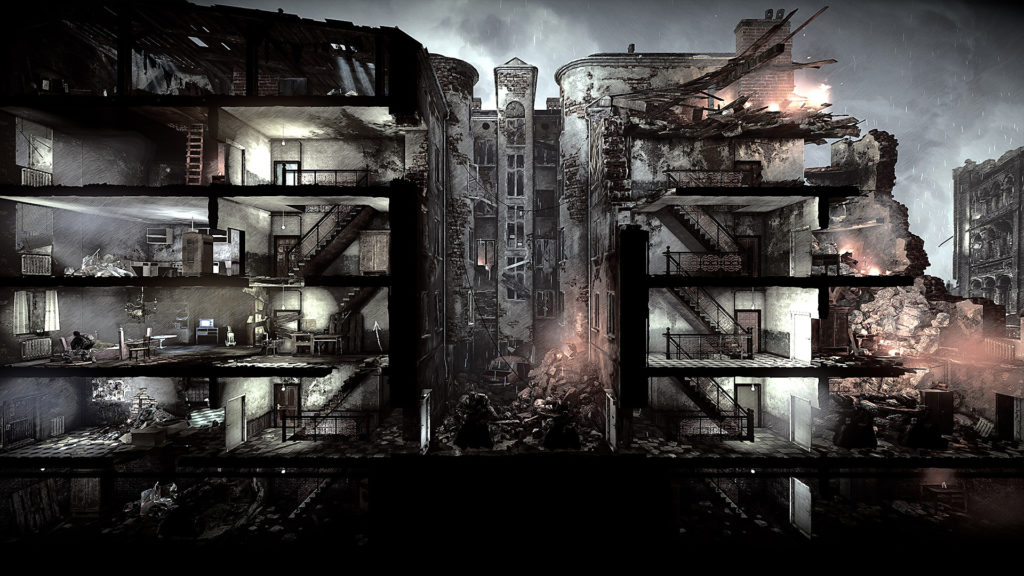
The only people on the battlefield are the victims and the perpetrators.
One by one, their comrades disappeared. Some lost their lives searching for supplies, and others left in despair. Houses that had come together hoping to survive the war are now empty, inhabited instead by despair.
Only Cveta, a middle-aged woman with no attributes other than a love of children, and Misha, a young boy, were left behind. Cveta has been injured by the robbers and is limping. Misha’s psyche is on the verge of collapse. He spends his days either talking to his imaginary friends or simply crying.
They have already run out of food. Their homes are raided and looted every night, and they have no supplies to trade on the black market.
I had no choice.
I gave Cveta a pistol and sent her to the old couple’s ‘quiet house.’ I knew there was no other place to get food and medicine.
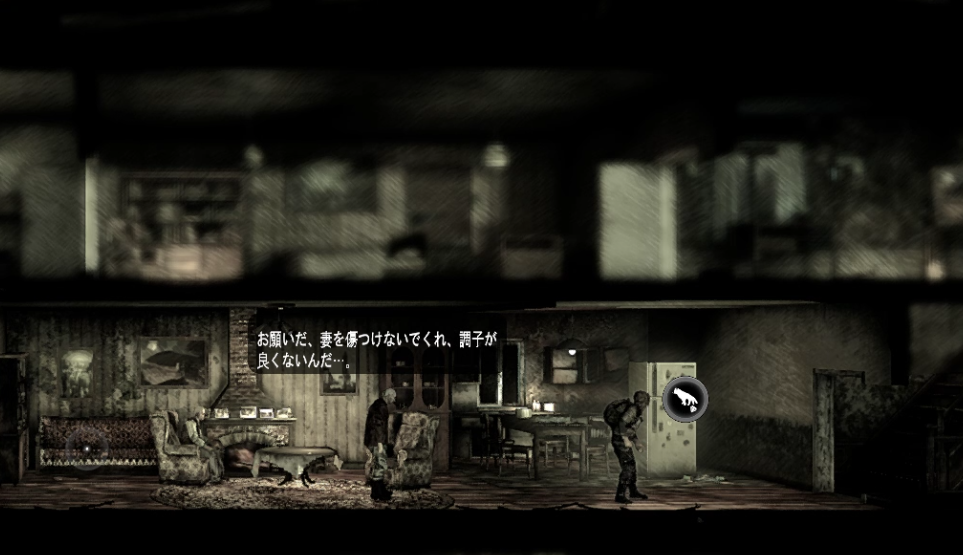
Cveta broke into the house, but the elderly couple did not resist. They followed behind Cveta and pleaded weakly.
Please. Please don’t take my wife’s medicine.
Please don’t hurt my wife. She is not well.
Poor people, but they have no choice, I thought to myself. But when I heard their voices pleading for help, I froze in front of the monitor.
But what should I do? If I don’t bring back the food and medicine, Misha and Cveta will surely die!
Please don’t take any food. I only have a little left.
Why are you doing this? Please come to your senses!
Now, my choice is not whether to send troops east or west. It is not whether to buy a sword or a bow or how to spend skill points.
Do I want to survive at the expense of the elderly couple? What is being asked of me now is my own humanity.
Where I am now is outside of a game. It was Sarajevo under siege in 1992.
Exactly, On the battlefield, there are only the victims and the perpetrators.
I have to choose which one I will be.
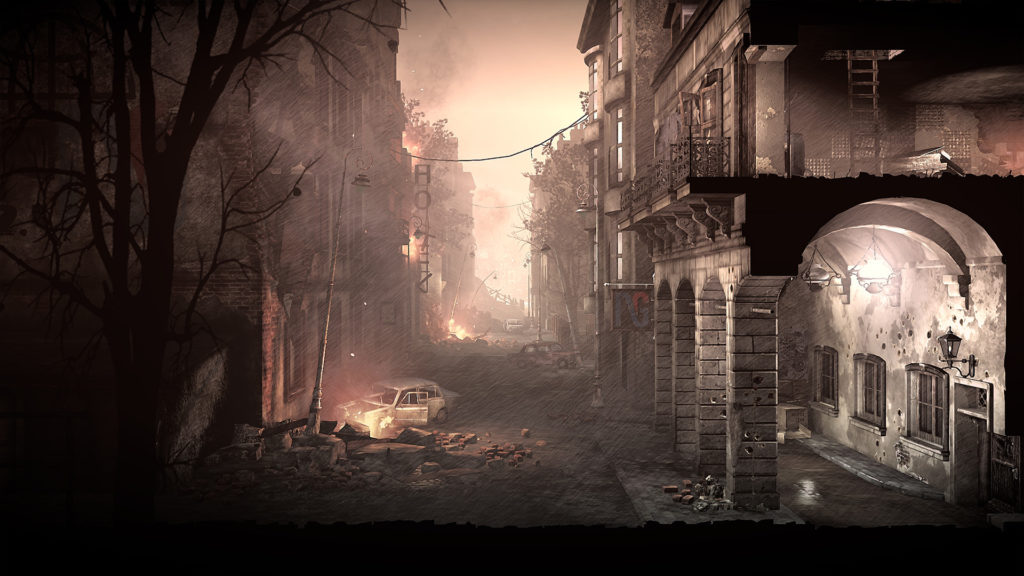
You walk towards the end of the war, day and night.
The structure of This War of Mine is simple. The game is divided into a day part for production and a night part for exploration, which alternate. The game ends if the player survives 30-45 days until the end of the war.
You spend the day at your base, producing food and water and making the equipment you need to live. You will also need to reinforce walls and windows in case burglars attack at night. You will also encounter events such as neighbors coming to you for help or offering to barter.
In general, your safety will not be threatened during the day.
The night is dangerous. You need to send one of your characters into town to get supplies. However, armed NPCs will be waiting for you in town, and your character may be murdered. You will also have to defend your base from robbers.
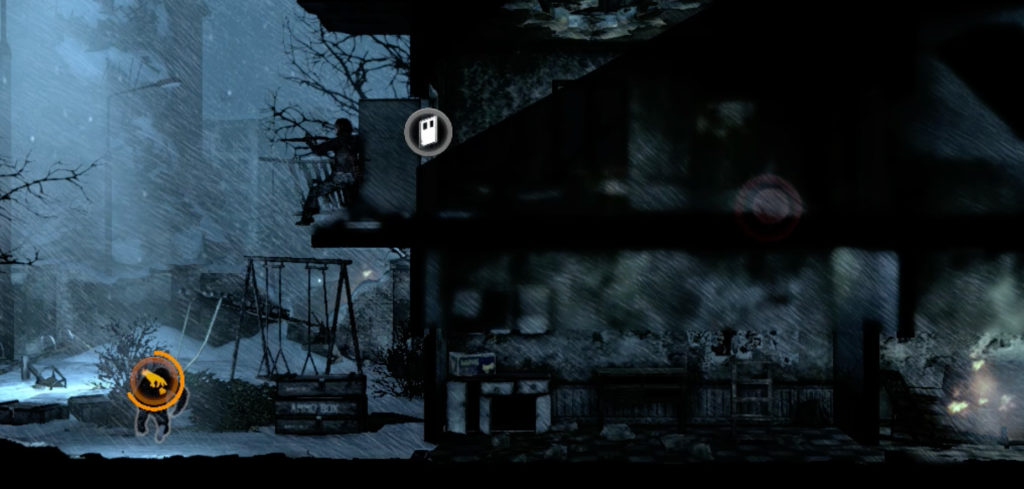
Eloquent in-game economy. It tells us that this is a war zone.
The production during the day belongs to the so-called colony simulation genre. However, it is straightforward compared to recent games of the same genre. You set up the familiar amenities: a bed to sleep on, a stove to cook on, a cistern to filter rainwater to produce drinking water, and so on.
Every equipment can be upgraded, but it soon reaches its limits. There is little room to develop new equipment and technology.
Equipping equipment also allows you to produce herbs, tobacco, and medicines. However, production is limited to the time it takes to develop the equipment, making it inefficient.
The production technology tree is not scalable and production is low. In other words, the in-game economy is very small and poor.
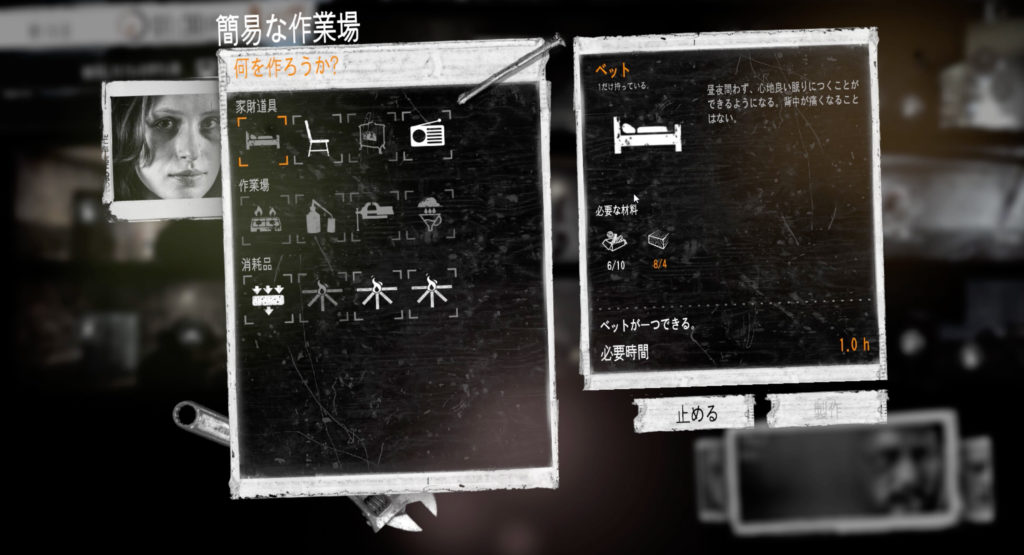
In regular colony sims and survival games, the core of the experience is the ongoing sense of accomplishment as the colony or base develops. Players will rejoice when they can increase the population, build new facilities, or protect their colony from disaster.
Developers generally design the in-game economy to be rich. They design it so that there is a lot of room for development and that the situation improves as the game progresses, motivating players to progress through the game.
Take RimWorld, for example.
The game starts with the character being thrown onto an unknown planet with a few supplies. The situation is worse and more desperate than in This War of Mine.
However, RimWorld does not feel stagnant like This War of Mine. Players progress through the game with hopes and expectations for the future.
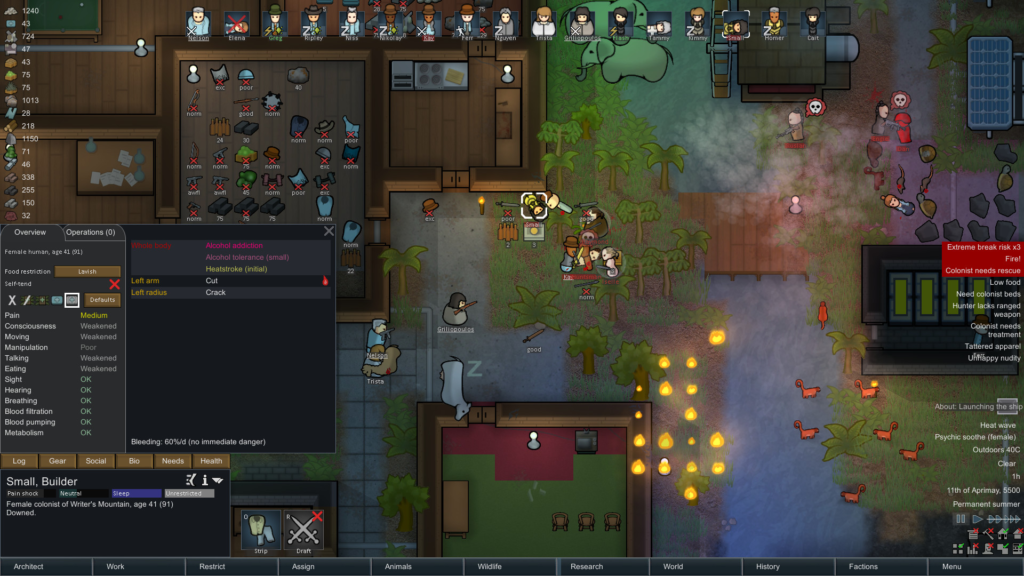
It’s not just the pretty pop-up visuals that get players excited.
As soon as you start the game, you will discover that you can collect wood and ore or grow food by farming. You’ll also be able to look at the technology tree and imagine the fun future that lies ahead.
A promising in-game economy.
Tomorrow will be a good day!
But This War of Mine is the opposite.
Supplies are always in short supply. You can only make a few items yourself, and every day, you set up a mousetrap to get what little food you can.
And the equipment technology tree shows no signs of improving the situation.
This is meant to represent the plight of the war-torn city.
The design of this in-game economy conveys the situation of the game’s setting very well to the player.
In-game economies are usually there to balance the game. Nothing more, nothing less.
However, This War of Mine shows us that the in-game economy is a more eloquent storyteller than we imagine. The in-game economy can express a worldview, a history, or a story.
Night. Stealth for survival.
This is not the only way This War of Mine uses game mechanics to embody how the world works. The mechanics of night exploration are also unique.
Players send a character to explore each night.
However, armed NPCs will attack players on sight. Players will, therefore, need to be stealthy and careful to stay out of the NPCs’ sight and sound.
If discovered, the characters must run, but if caught, they will be wounded or killed. If you manage to escape but fail to bring back enough supplies, the colony will soon be in danger of collapse.
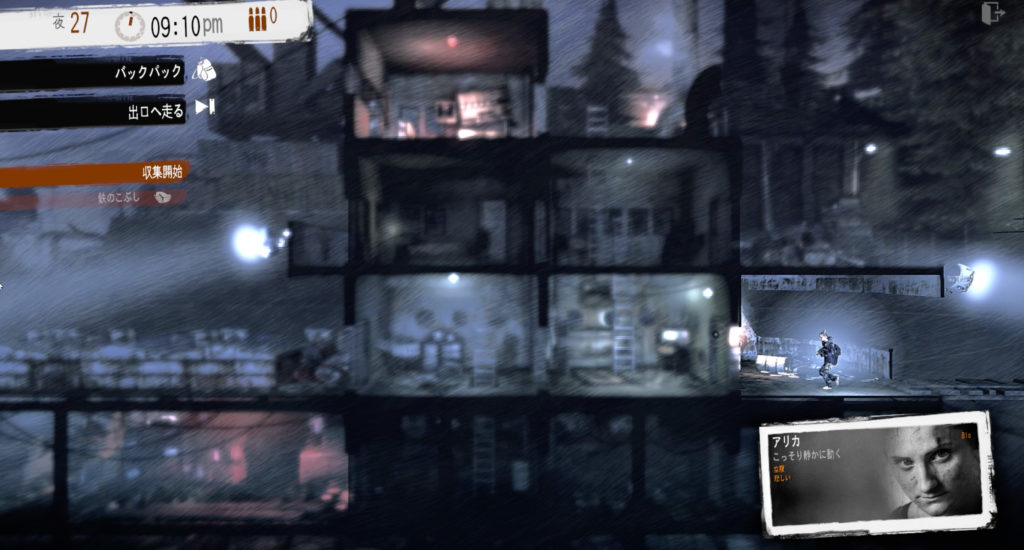
Night exploration requires stealth, but again, the game system is very simple—so simple, in fact, that some unfair situations arise. It is far from the perfection of great stealth games like the METAL GEAR series or Dishonored.
But even here, This War of Mine has one feature that differentiates it from other games.
The relationship between risk and reward needs to be more balanced. This may be intentional.
You have to go. Even if there is nothing there.
Usually, risk and reward are proportional in games.
Dungeons with strong monsters contain valuable treasures. Areas with high security hide valuable items.
This is not the case with This War of Mine. It is designed so that the rewards remain the same, but the risks only increase.
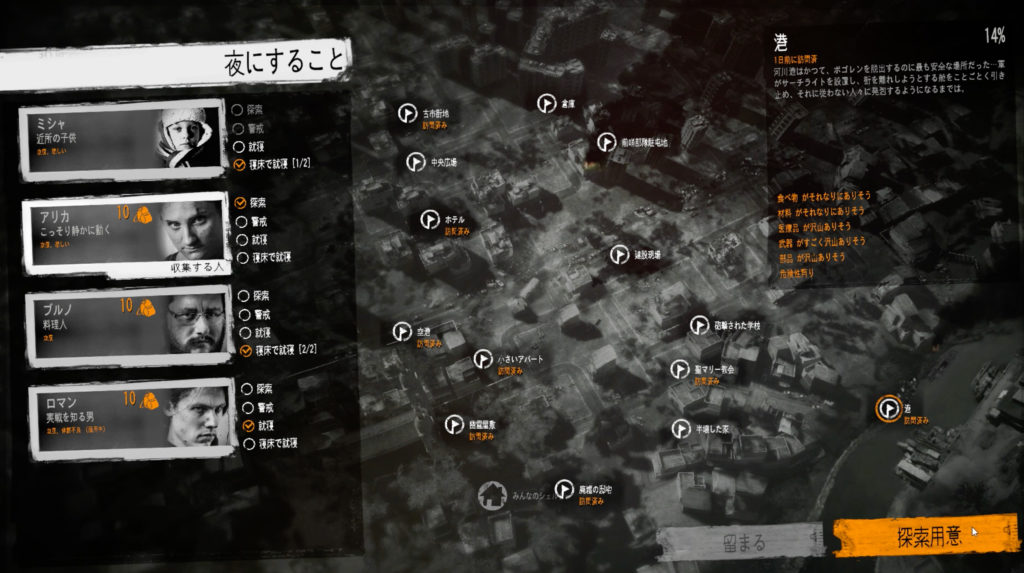
Exploration begins by choosing a single destination.
At the start of the game, you can choose a less dangerous location to explore. However, supplies will not be replenished, so the number of places where you can safely get supplies will decrease.
Then, there is no choice. You have to risk going into harm’s way to explore and bring back supplies because there is not much hope of production at the base.
So, are exploring dangerous places and acquiring supplies worth the risk? Unfortunately, the rewards are rarely worth the risk, and the increased risk is never worth the reward.
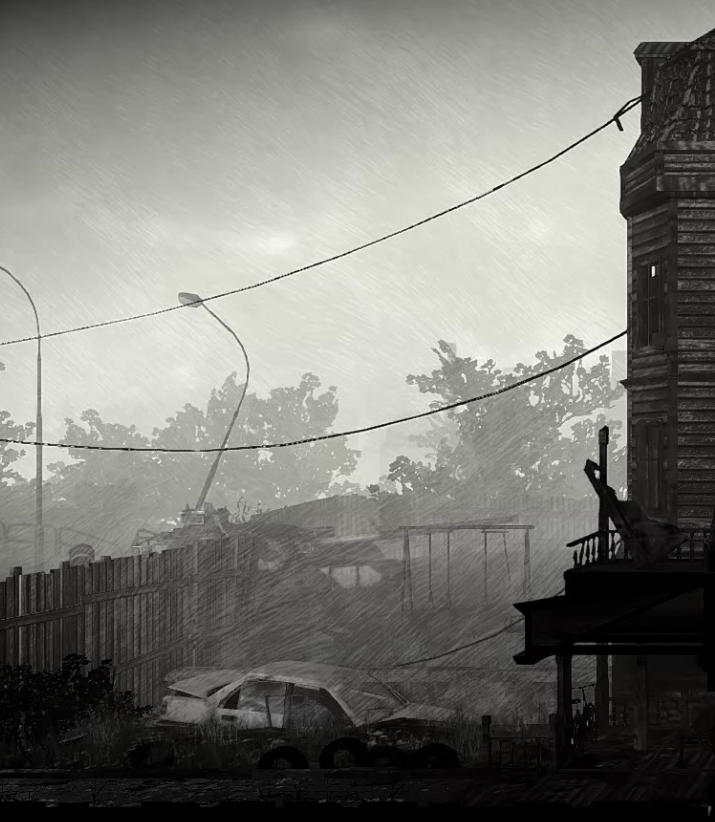
The reasons for this are apparent. The in-game economy could be better.
Because of the small variety of items in the game, there is no room to increase the quality of rewards proportionally to the increased risk of exploration.
So, the reward you get stays the same, but the risk increases.
I Have Blood On My Hands, How Long Til It Lies In My Heart.
The player is cleverly backed into a corner.
And when the risks and rewards of exploration are out of proportion, the choice is revealed to you.
It is stealing and killing. It is a choice to survive by any means necessary, without regard for ethics.
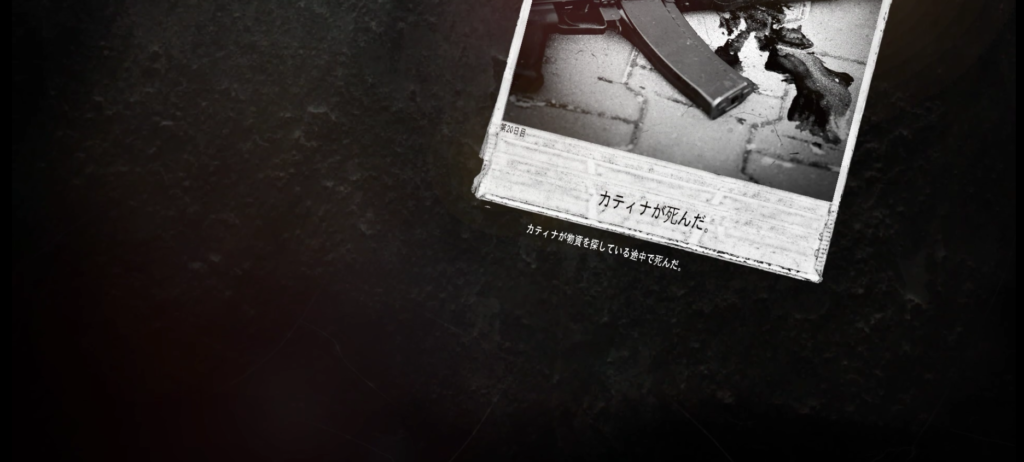
Throughout the game, its entrances invite players from all over.
You can easily reach out and steal from others. You will soon find helpless citizens in hiding.
When the game is running smoothly, those options are just background noise. But when you’re in a tight spot, they will catch your eye as your last hope for survival.
Would you steal food from others to feed yourself?
Would you take the lives of others to survive yourself?
What would you do?
This can be done with a single click. You attack and move the items you’ve captured into your inventory.
It’s what you do all the time.
But it takes work.
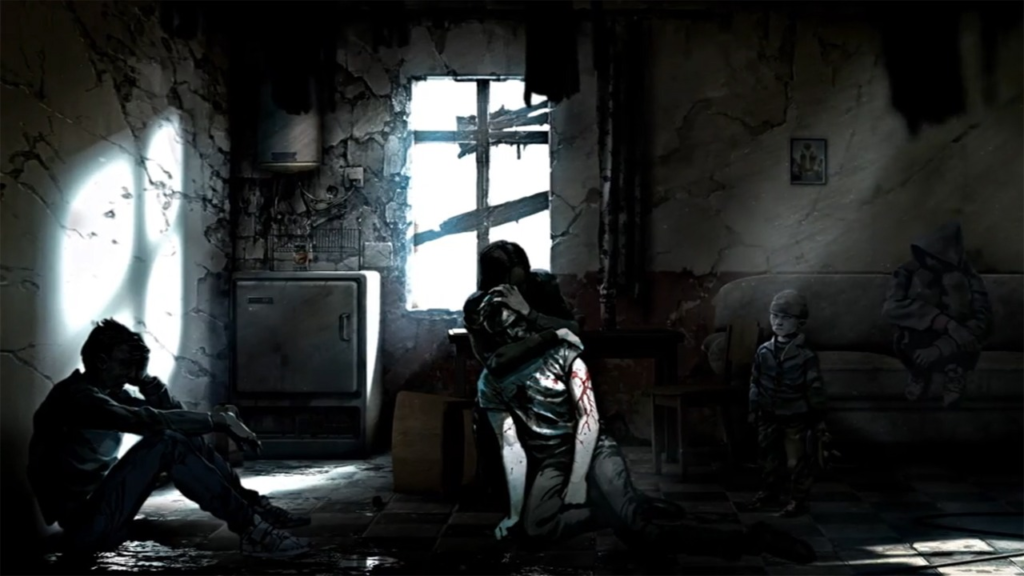
Many games offer unethical choices.
In Grand Theft Auto, you can easily beat up or shoot passers-by. But how you act is entirely up to you. And you do not have to pay for your actions.
You may or may not kill Galahad and take the Ice Sword in Romancing Saga.
Whether you massacre the city of Balmamussa or not, Ramza’s story does not end in Tactics Ogre.
However, at the heart of the game mechanics of This War of Mine is a built-in choice between ethics and game over. Players are asked to make ethical severe choices, not just as a plaything in the game.
You may feel that your humanity is being questioned. This will be much harder than playing the game well.
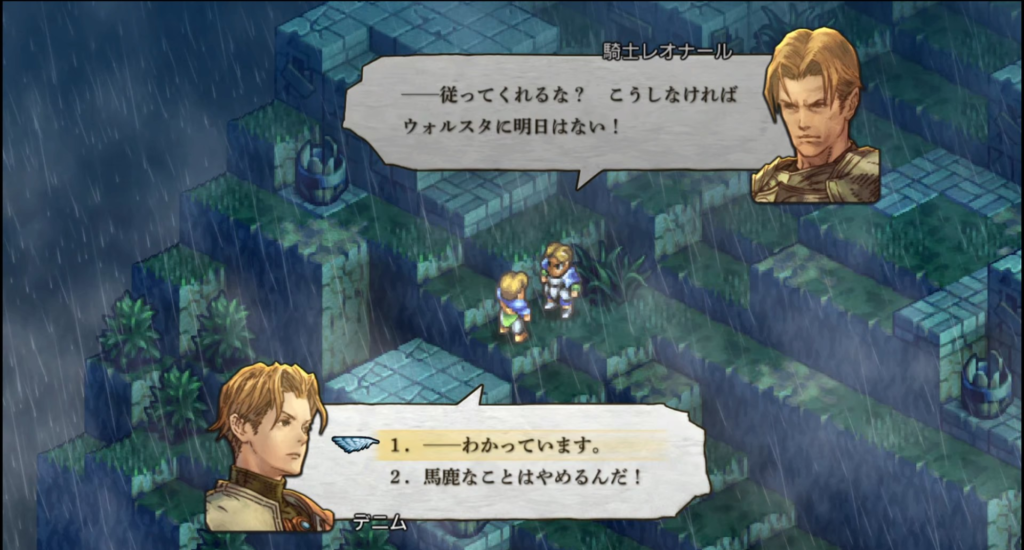
The game also has visible penalties for unethical behavior.
Characters have a status that indicates their mental state. Stealing, for example, will cause the character’s mentality to deteriorate, eventually leading to a depression-like state. When this happens, the character cannot take any action, which is a severe hindrance to the game’s progression.
This is worse than losing a character. This is because a character with a mental breakdown cannot contribute anything and will only consume food and water.
I want to be a hero. No Stress, No Pressure
This War of Mine is asking you to make these kinds of ethical choices here and there.
Early in the game, a child may ask you for protection.
How many people would refuse?
Many players will accept their children and try to protect them. They will believe they can protect them. Because you have always done so in previous games.
In This War of Mine, however, there is nothing that children can do. They will just eat faster, and nothing good will come of it.
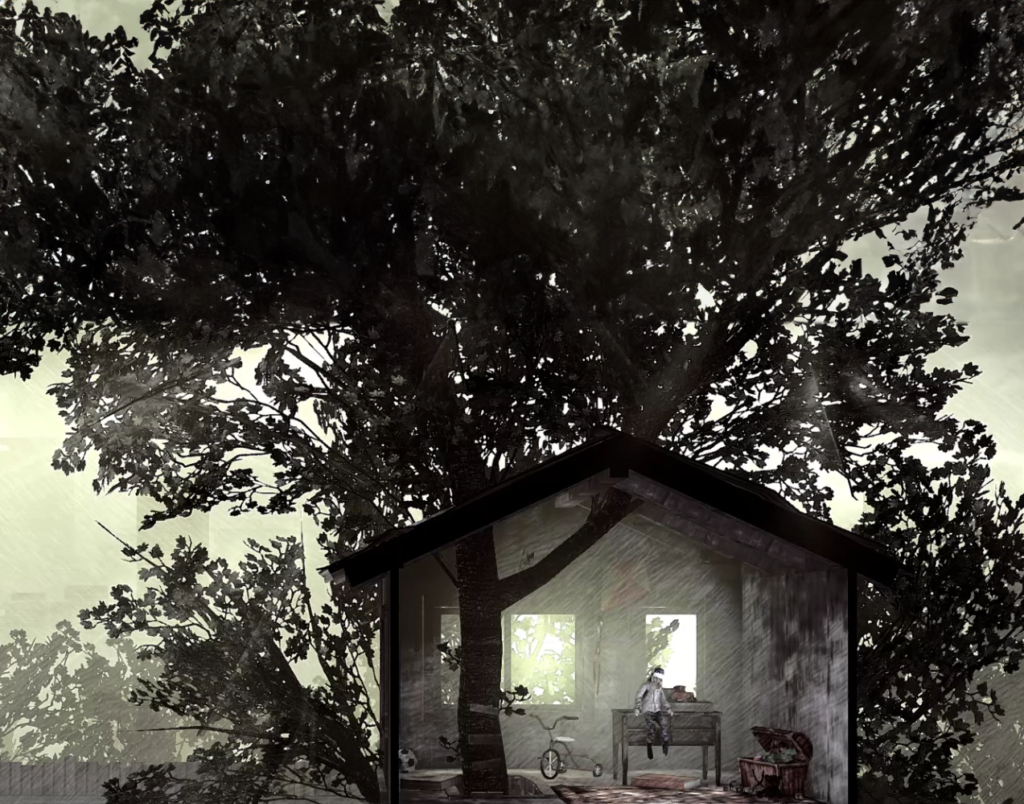
We are used to performing heroic deeds in games.
And not just because we know the unspoken rule of the game: that good deeds have rewards.
We want to be heroes, at least in games.
And ‘games’ always fulfill this wish.
Quickly, easily, the way we want.
But we both know that.
The real me is not a hero. We need to be more vital to help those in need. We pretend we don’t see them, walk past them, and defend ourselves with plausible excuses. We do not dare face difficulties.
That is why we want to be different in the game.
This War of Mine definitely sees through our desire for heroism in gaming. It takes advantage of that, stripping us of our robes and asking us to come at it as we are.
It’s an experience that reveals a part of you that you didn’t want to see.
But at the same time, it’s a great moment.
Because it’s a place that only the game can take you to.
Story of Your War
The game ends when the war ends after overcoming various difficulties.
The war’s end is 30-45 days after the start of the game. The end is not clearly known, so you have to wait impatiently.
We never get a sense of achievement when the game is over.
We are left with relief that it is finally over, tiredness, and a small scar on our hearts.
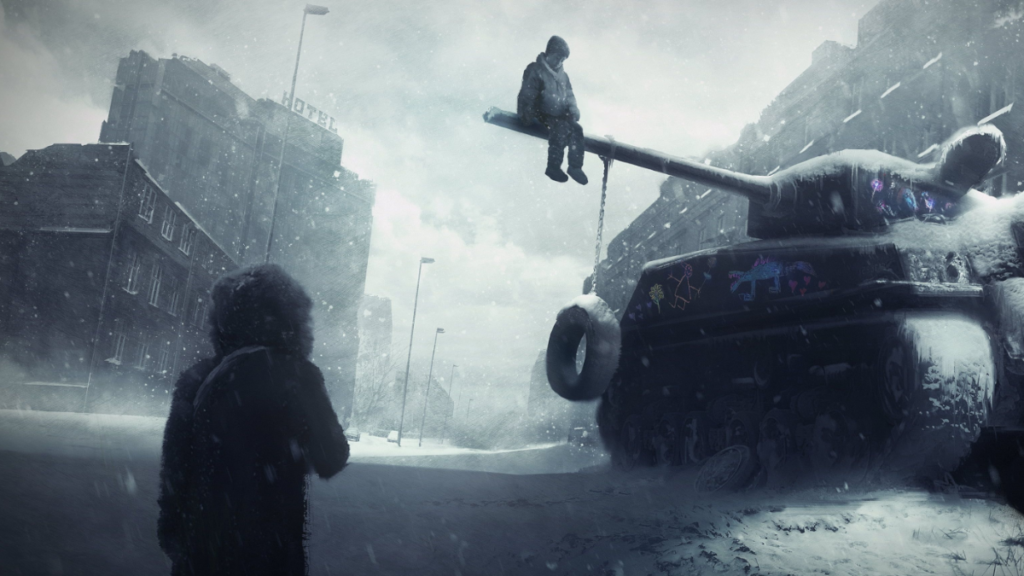
This War of Mine has clever mechanics leading players to ultimate choices.
But you can avoid these difficulties and end the war in one piece.
If you manage your resources well, know what you need now, and can assess the risks and rewards, you will not be forced to make decisions that could cut your heart out.
On several occasions, I have ended the war without incident. Anyone can, if they play, and gain experience and knowledge of the game.
Ironically, however, it takes you away from the essence of This War of Mine.
The better you get at the game, the less valuable the experience becomes.
This sense of swing makes the experience so valuable. You can be sure that your gameplay was definitely your own story.
This must have been a courageous decision for 11Bit Studio. Because they might not be able to convey the experience they wanted to offer.
However, by allowing for this swing, it created a ‘future that was not chosen’ and gave value to the ‘chosen future’.
The only people on the battlefield are the victims and the perpetrators.
I didn’t know what to do at the old couple’s house.
They just begged me.
Please don’t take any food. I only have a little left.
Why are you doing this? Please come to your senses!
Food in the fridge. Medicine on the shelves. If I bring this back, Misha and Kveta have a good chance of surviving this war. But the price is clear.
Should I be a victim or a perpetrator?
I froze in front of the monitor.
I hesitated for a long time.
Then, after all that, I finally, finally ran and got out of there.
Without taking anything, without stealing anything.
My reason for running away from the old couple’s house was not a sense of justice, that it’s not good to take someone’s life, whatever the circumstances.
I simply could not make a choice.
The reality of the war zone, where the choice is between victim and perpetrator, left me helpless, and I ran away pathetically.
As usual, I wanted to play the cheesy hero in the game. But I was thoroughly beaten down.
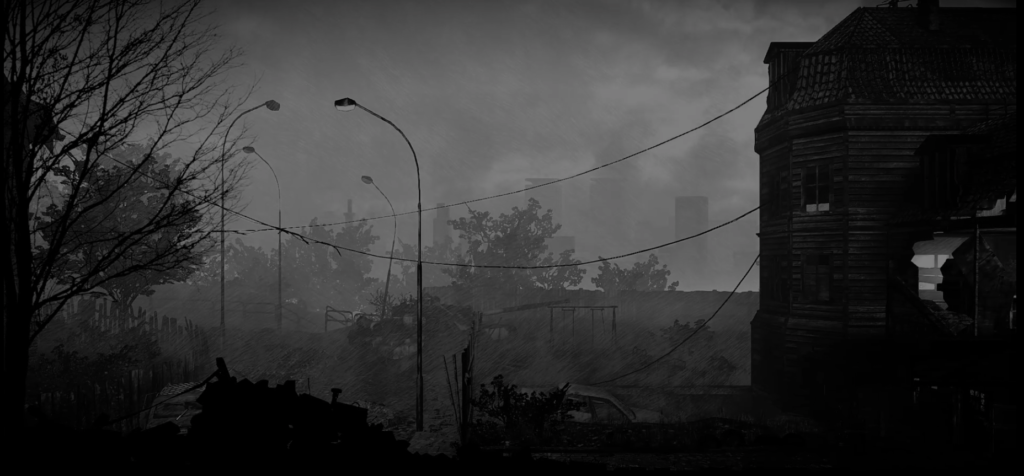
Cveta slumps her shoulders and toddles home. Mischa still sits on the floor, crying.
I kept apologizing to them, over and over again, in my mind.
I’m sorry, I’m sorry, I’m so sorry.
Or maybe I was crying then.
The next day, Misha ended his short life, and two days later, Kveta died.
Game Over.
For the first time in my life, I voluntarily chose Game Over.
Stories are created by their own actions, choices, and decisions.
I was struck by an experience I had never had before in a film.
The view I see now is quietly changing. I have experienced this feeling before.
I see, so this is the ‘game.’
This War of Mine.
The story that changed me.